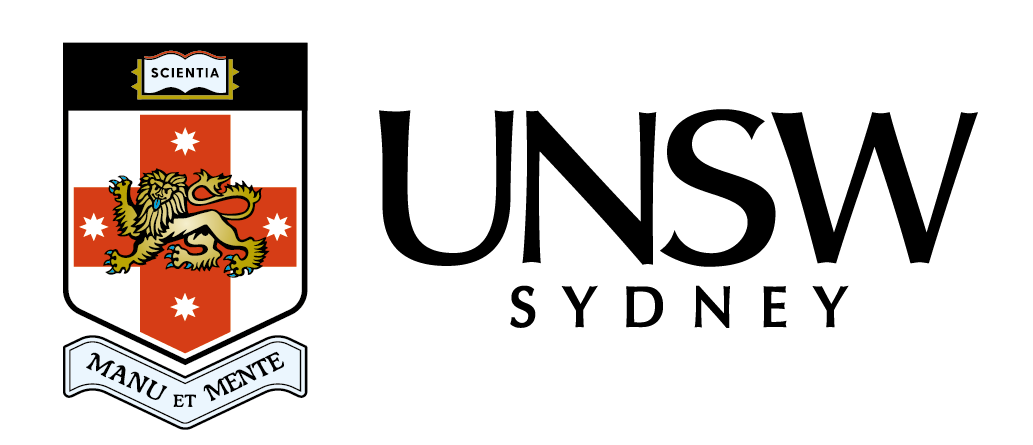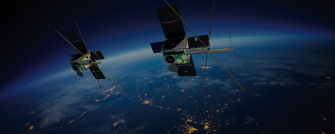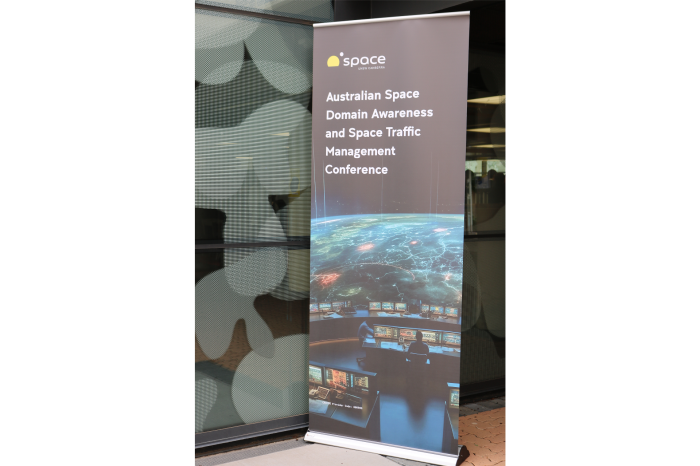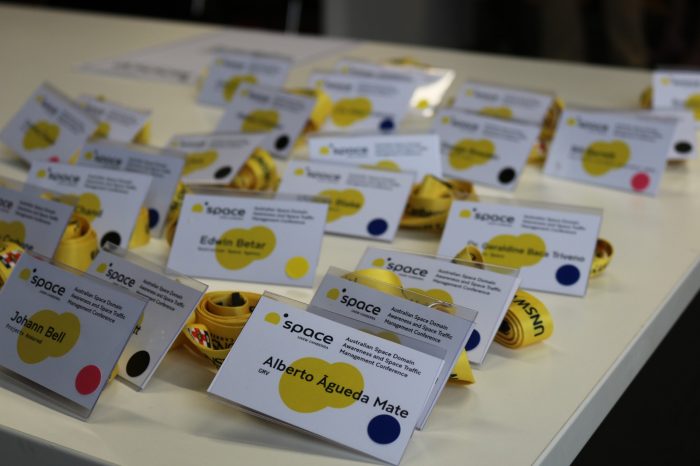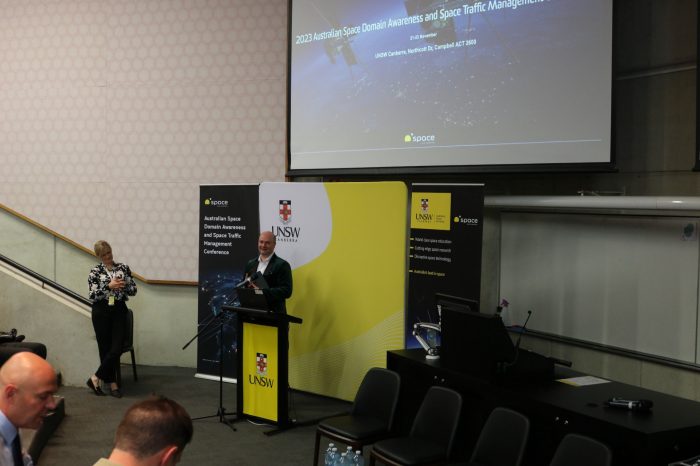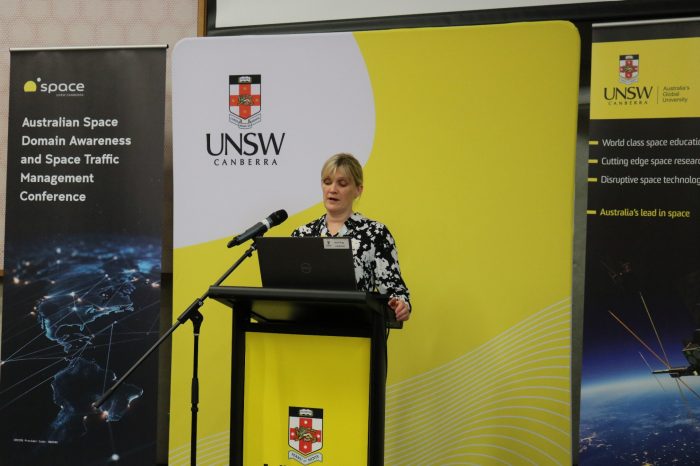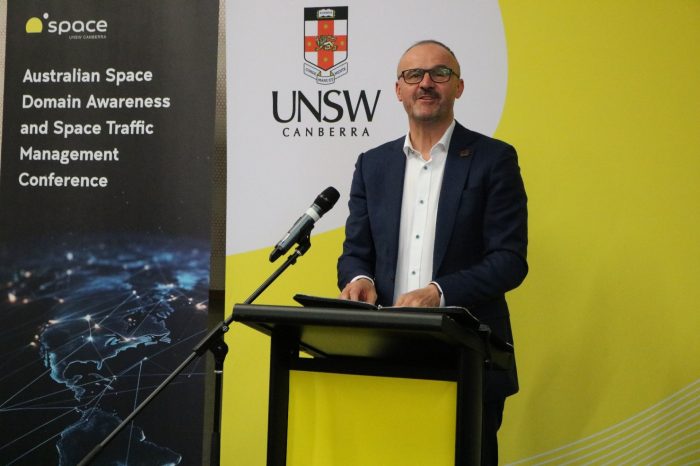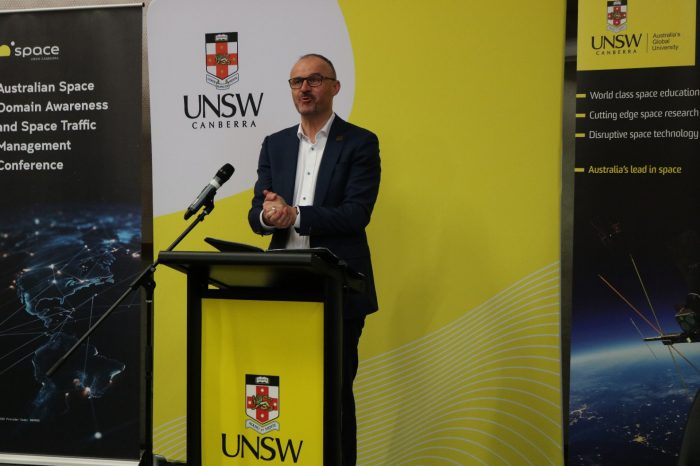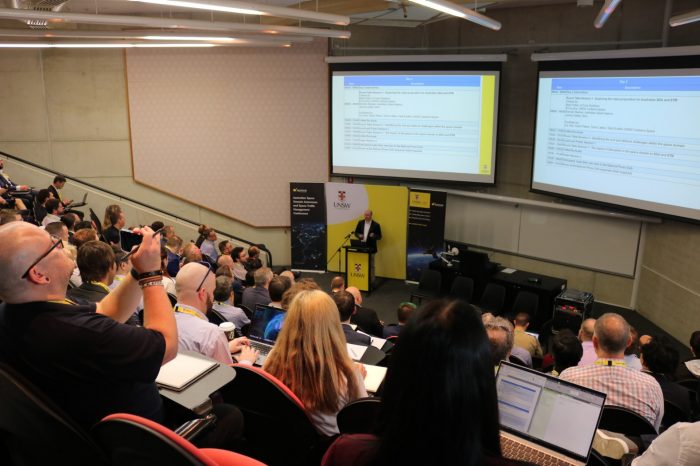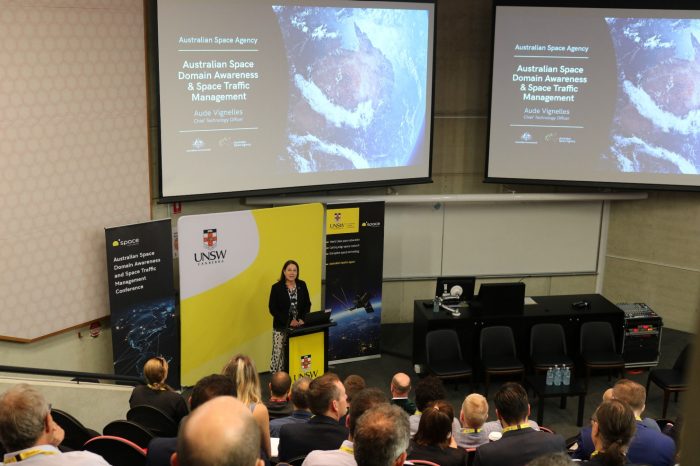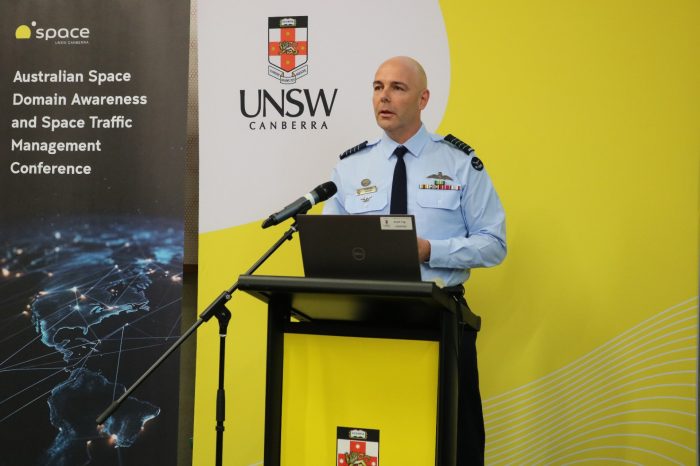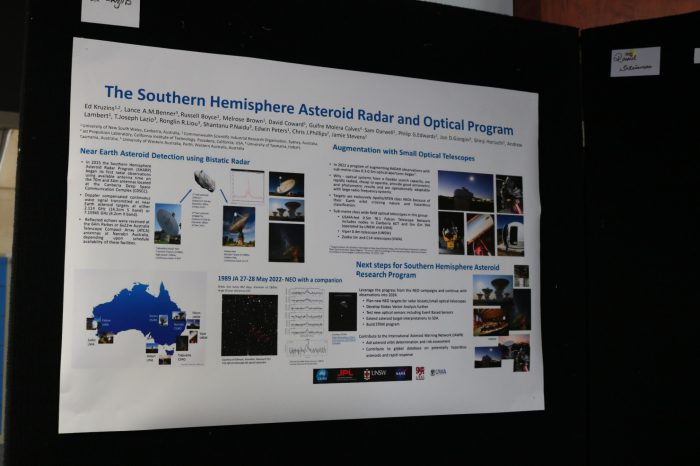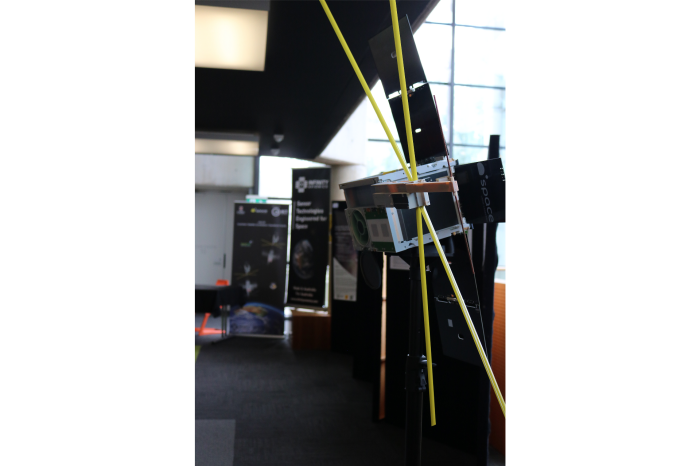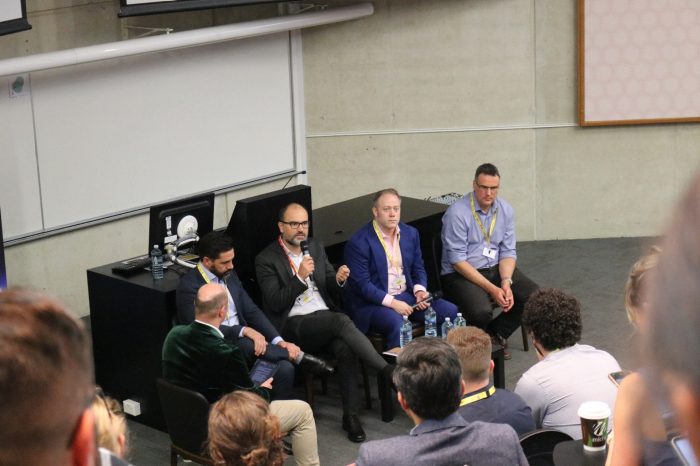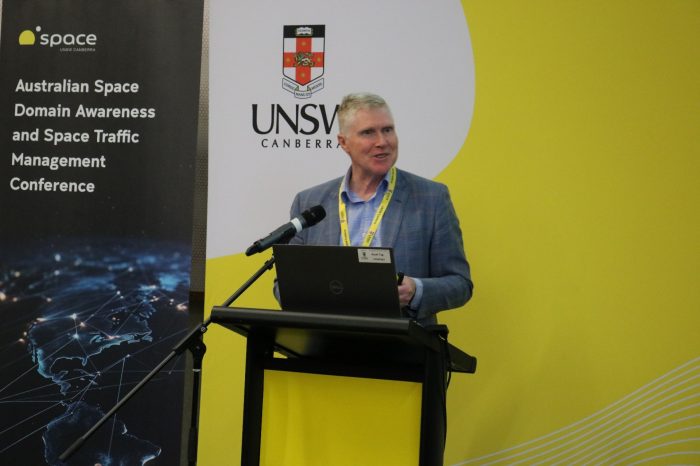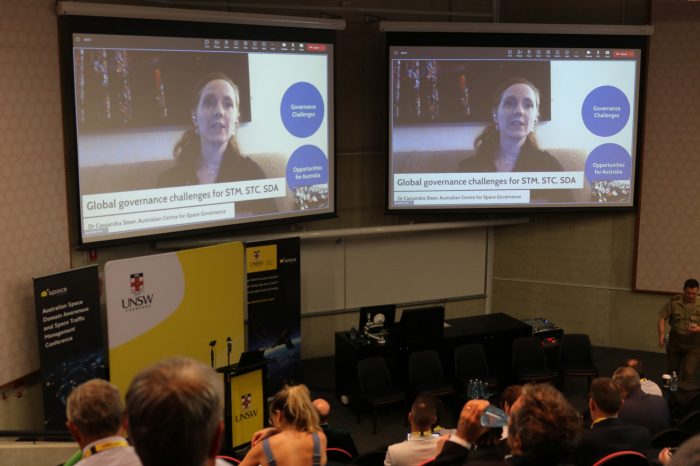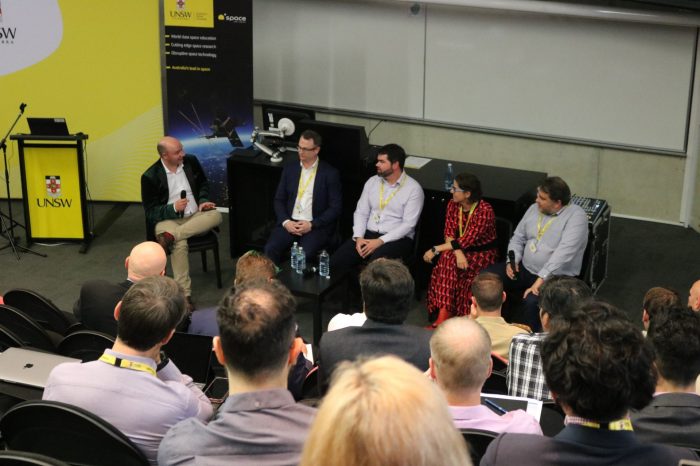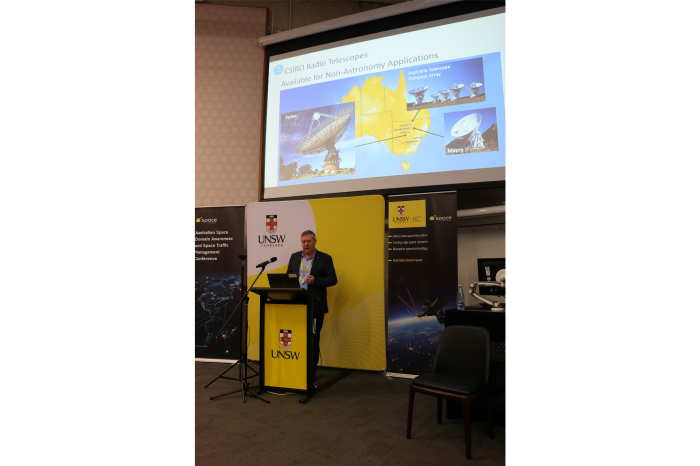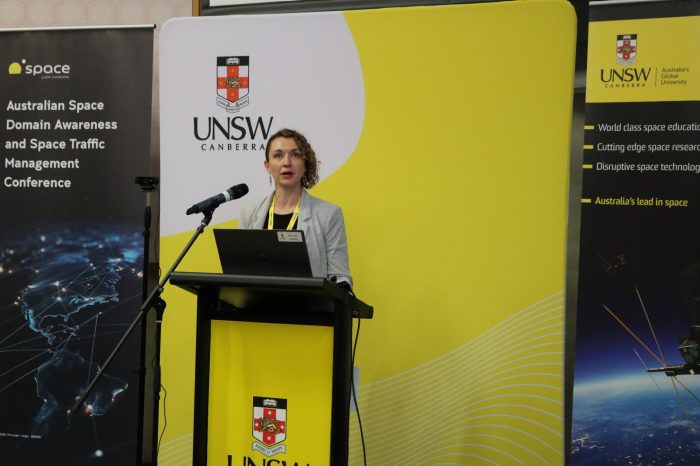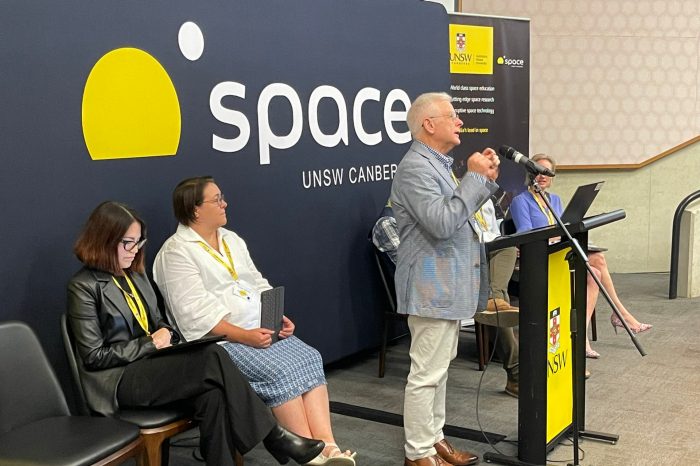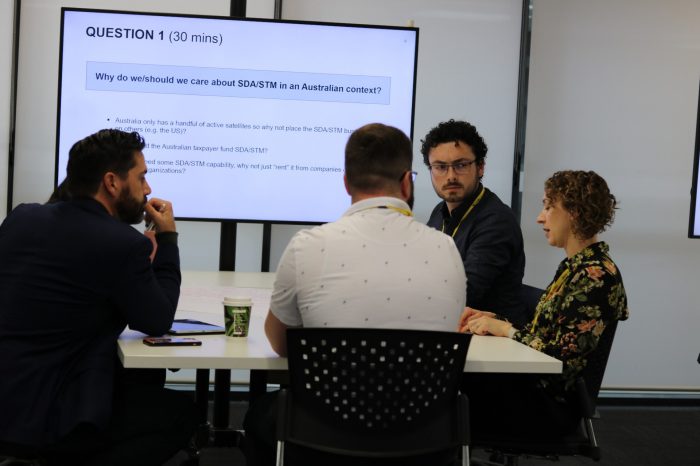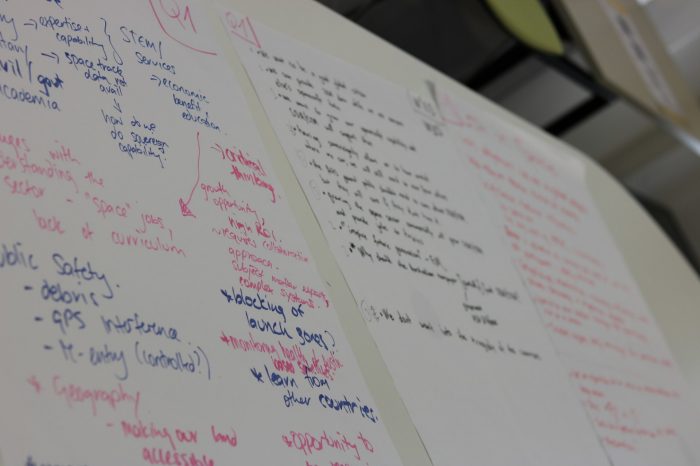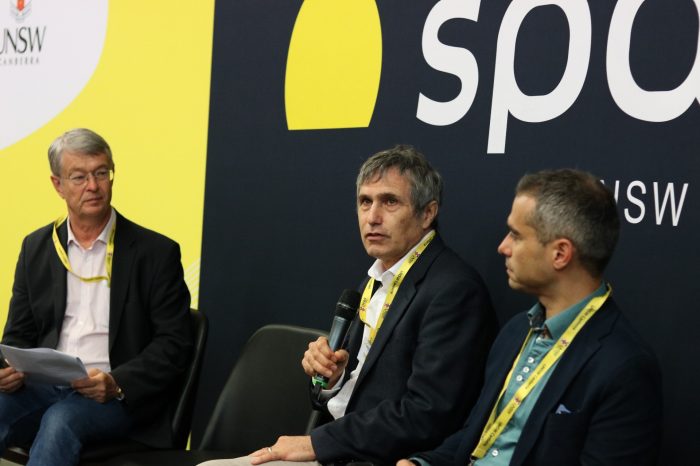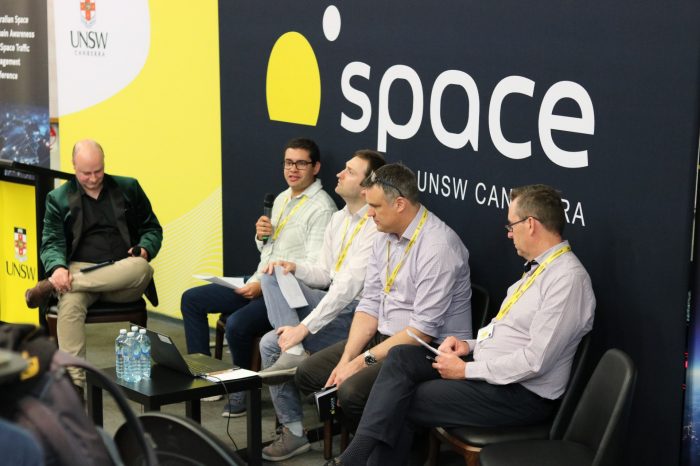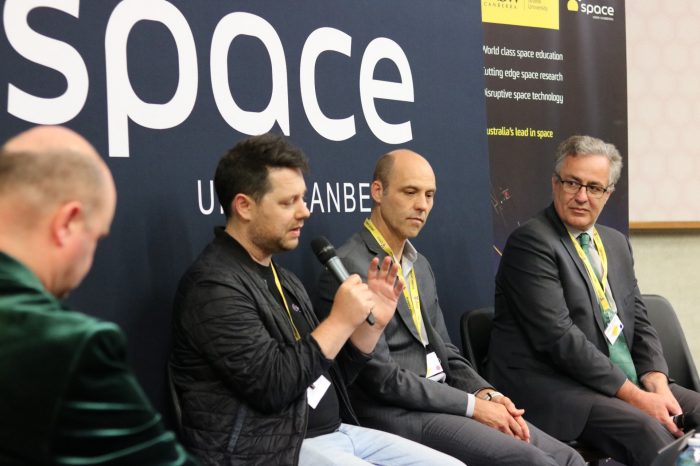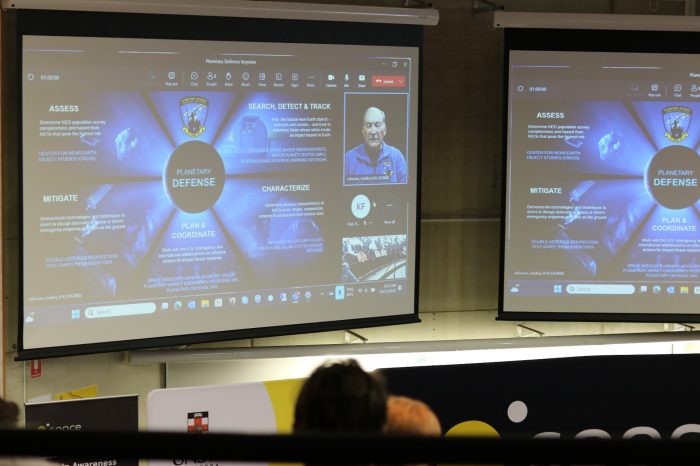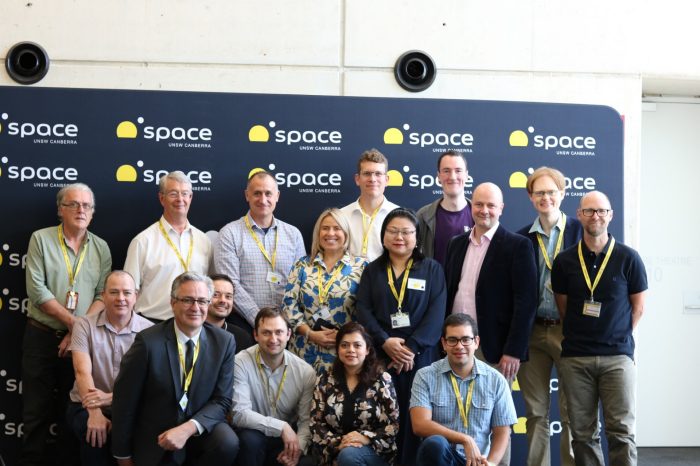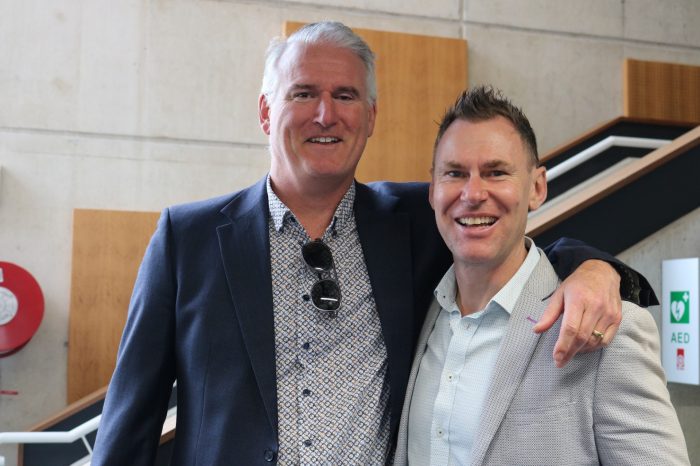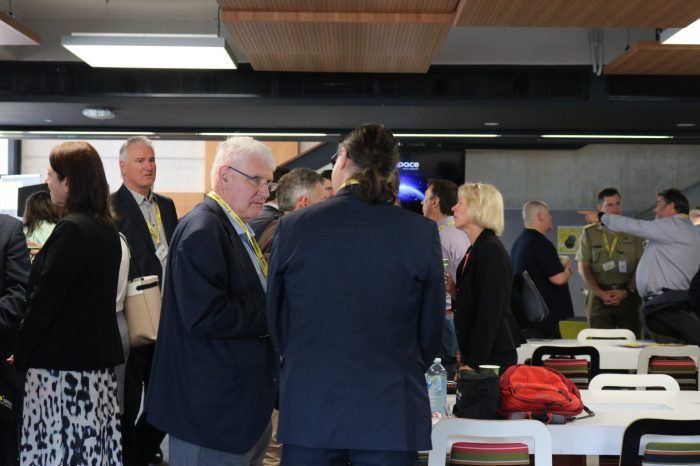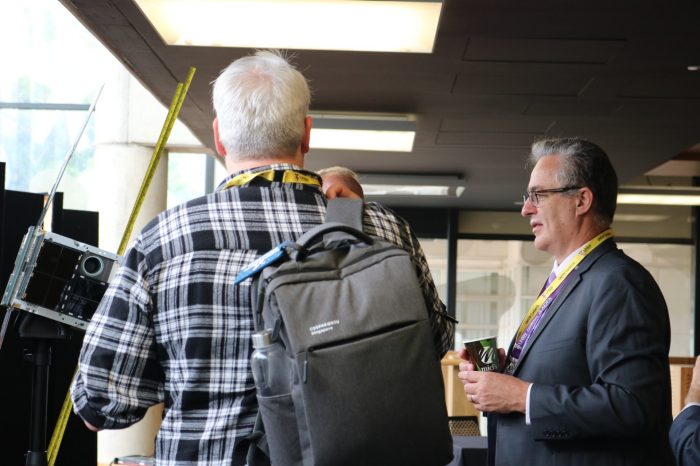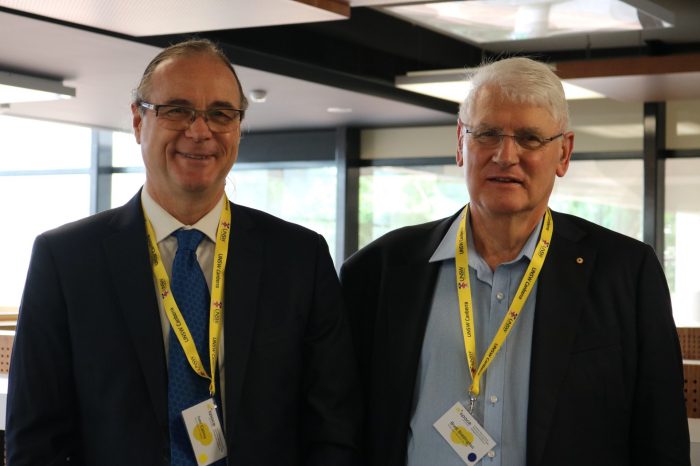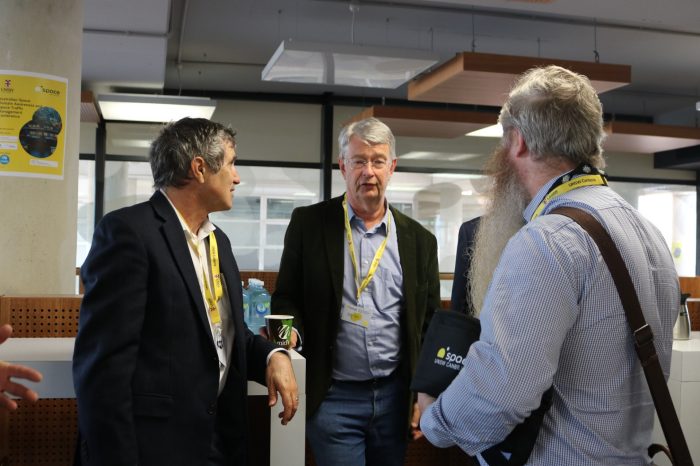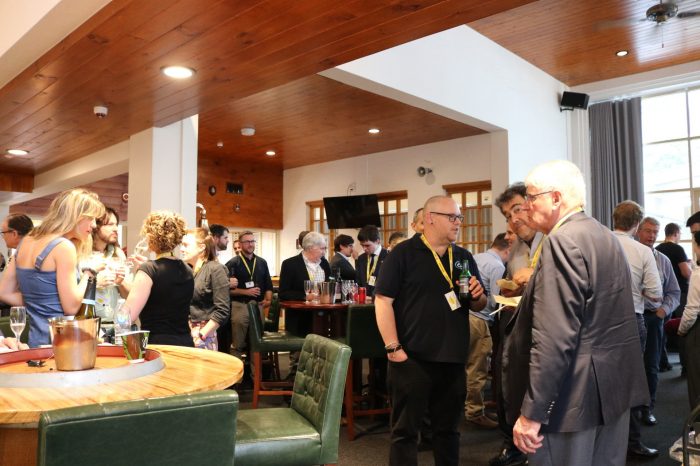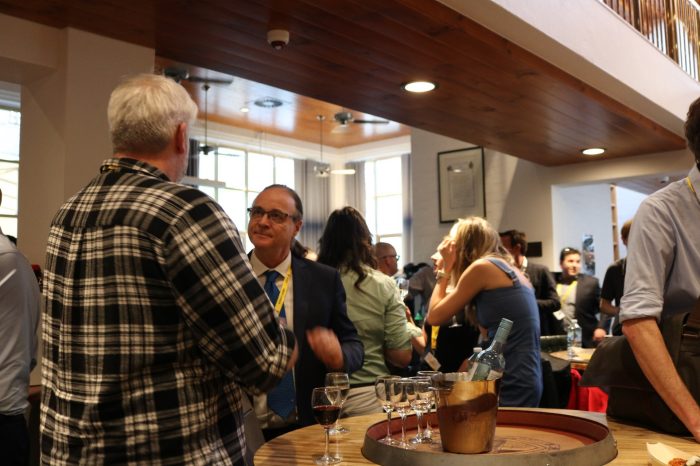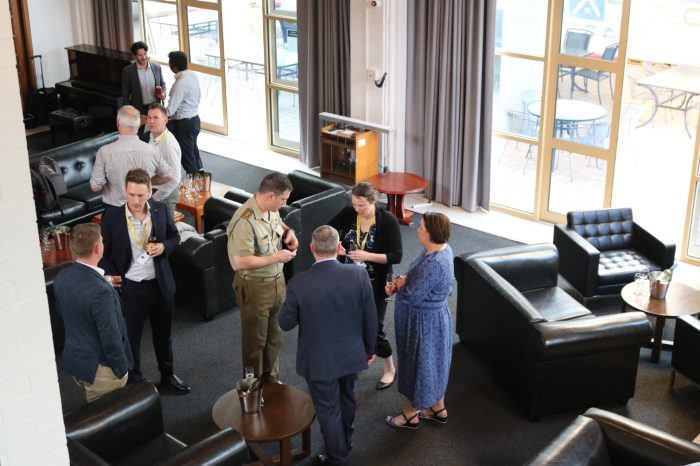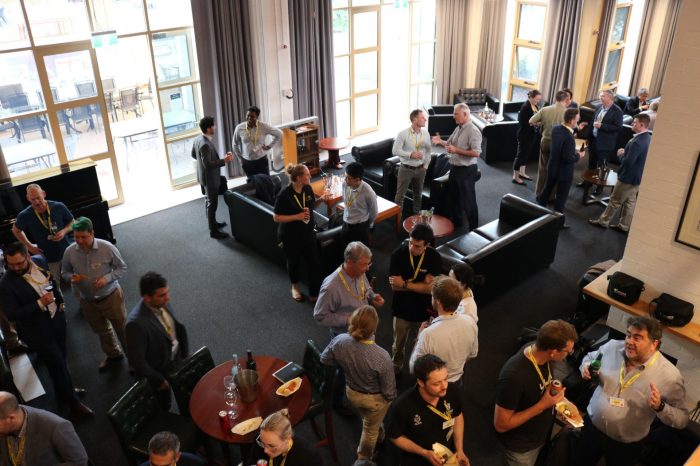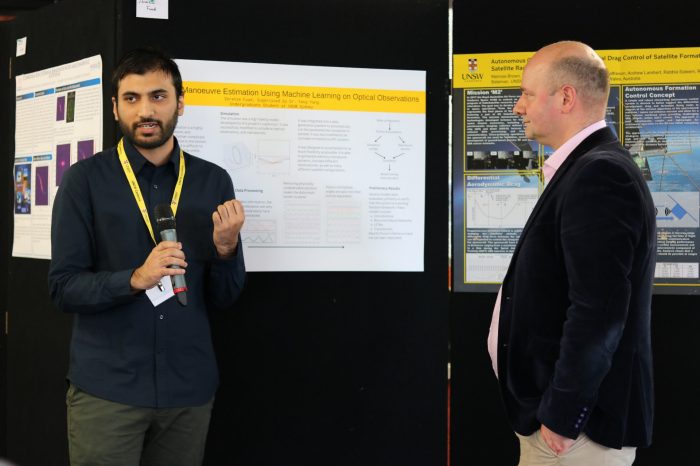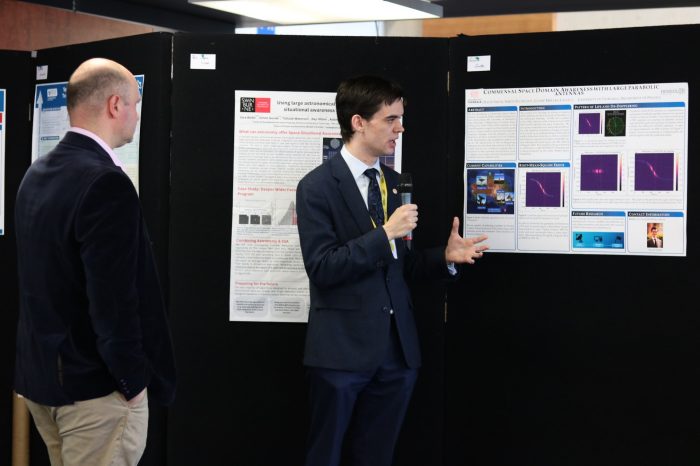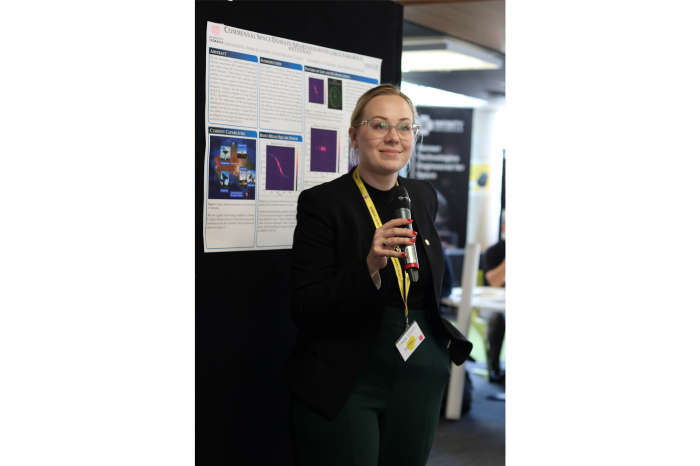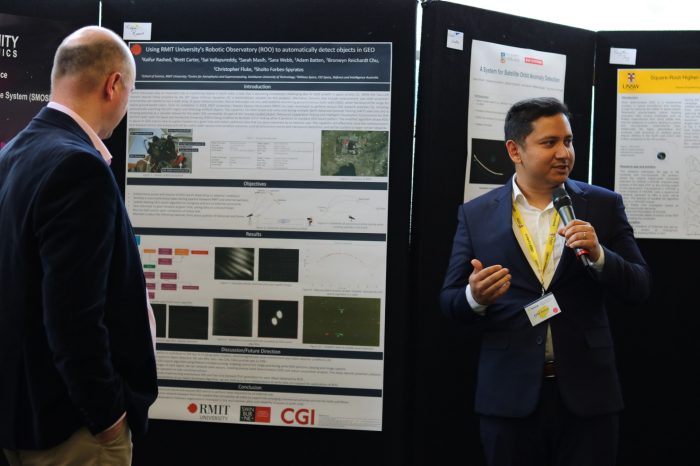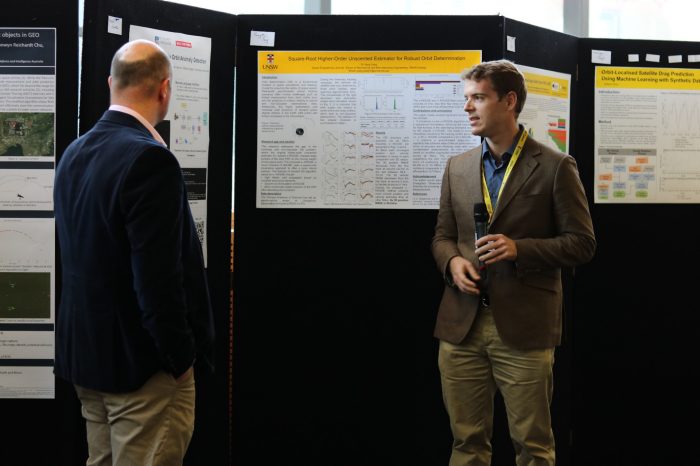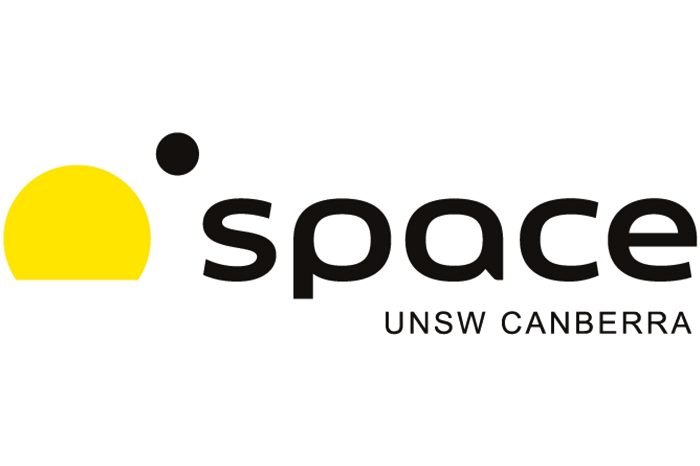About the Conference
The Australian Space Domain Awareness and Space Traffic Management Conference brings together key researchers, users, and decision makers from the Australian space sector.
The conference will focus on developing a set of shared priorities and goals among the Australian SDA community to enable Australia to meet the evolving challenge of safely and responsibly operating within the space domain.
The conference will:
- Showcase new and emerging Australian SDA and STM techniques and technology
- Collectively identify and prioritize gaps in SDA capability and STM systems
- Collaboratively define a strategy to exploit Australia’s advantageous location to develop a world class SDA and STM niche
- Provide a means to benchmark and measure the collective Australian SDA capability each year
- Provide an inter-disciplinary forum to drive Australian SDA and STM policy and business initiatives
The conference will run over 3 full days, consisting of talks, workshops and poster sessions with key focus on: sensors; analysis and data processing; space catalogue modernisation and STM concepts; satellite protection; regulation/policy/ethics (mitigation guidelines); economics/business models to sustain Australian SDA efforts.
Key Dates
Poster abstracts submitted by: 25 October 2024
Registrations close: 13 November 2024
Conference: 19 to 21 November 2024, inclusive
Networking evening: 20 November 2024
Conference (Gala) dinner: 19 November 2024
Register Attendance
Prices from 12 October 2024
General Conference Admission: $495.00
Student Conference Admission: $300.00
Conference Dinner: $150.00
Defence Personnel Conference Admission: $450.00
Defence Student Conference Admission: $250.00
Speakers
Keynote Speakers
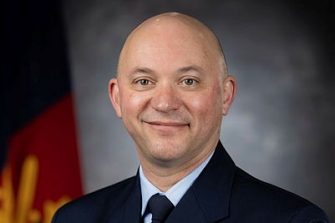
Group Captain Peter Crookes
Director Force Generation, Space Command
Group Captain Crookes is an Air Battle Manager with over 25 years of experience in the ADF. Since graduating from initial training in 1996, Group Captain Crookes has undertaken a range of postings across 41WG, including: 3 Control and Reporting Unit; two postings to the Surveillance and Control Training Unit as an instructor and Executive Officer; and three postings to 1 Remote Sensor Unit as Crew Commander and Training Officer, Executive Officer and Commanding Officer.
Group Captain Crookes has held Staff positions in the AIR2025 (JORN) Project Team, as the AOC Planner at Headquarters Air Command, the Navigation Warfare Project Manager at (the now defunct) Capability Development Group, and Deputy Director for Space Control capabilities at Air Force Headquarters. He has twice been posted to the Air and Space Operations Centre at Headquarters Joint Operations Command: in Strategy Division, and as Chief of the Australian Space Operations Centre.
Group Captain Crookes was appointed Commanding Officer of 1 Remote Sensor Unit in December 2021. During his tenure 1RSU was the recipient of the Markowski Cup, awarded to the Air Force’s most proficient specialist support unit. Additionally, WGCDR Crookes was responsible for the transition of tactical space systems from 1RSU to Space Command.
Group Captain Crookes briefly held the position of Director Counter Advanced Missile Threat in VCDF Group, before commencing his current role as Director Force Generation in Space Command.
Group Captain Crookes deployed in 2010-11 under OP SLIPPER as a Senior Director at the 71st Expeditionary Air Control Squadron, responsible for tactical command and control of air assets in Afghanistan.
Group Captain Crookes is married to Janine, and has two sons and a daughter. Group Captain Crookes holds a Masters of Military and Defence Studies from the Australian National University; additionally, he was awarded an Air Commander’s Silver Commendation for his role of AOC Lead Planner during Exercise Talisman Sabre 2007.
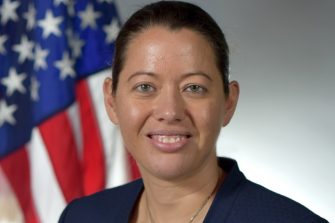
Barbara Golf
Strategic Advisory for Space Domain Awareness, US Space Force
Mrs. Barbara A. Golf is the Executive Agent for Space Domain Awareness (SDA) within the Space Domain Awareness and Combat Power directorate, Space Systems Command, Los Angeles Air Force Base, California. In this role, she directs the SDA DOTMLPF-P (doctrine, organization, training, materiel, leadership and education, personnel, facilities, and policy) activities to align the enterprise with integrating quickly into operations. She was recently dual-hatted under USSF/Space Force Component for Space (S4S) with SSC as the lead for commercial operations, including the Joint Commercial Operations (JCO) cell, Commercial Integration Cell (CIC), and other initiatives such as Tactical Surveillance, Reconnaissance, and Tracking (TacSRT).
Mrs. Golf is a 2003 graduate of the United States Air Force Academy and started her Air Force career at the Space and Missile Systems Center at Los Angeles Air Force Base, California. She has served as a space acquisitions officer for radar and communications systems, establishing an excellent program management record in high-stakes, interagency developments. She went on to support streamlined acquisition efforts for multi-billion-dollar Naval contract actions to provide secure handheld radios to combat units across the globe. Later joining the Space Superiority Systems Directorate, Barbara spearheaded space kill chain analyses to assess end-to-end capabilities against multiple threat vignettes, creating overarching strategic architectures with time-phased investments for three mission areas – Space Control; Space Situational Awareness; and Battle Management Command, Control, and Communications. She evaluated technical readiness levels for prototype capabilities, supported military utility and risk assessments, and coordinated technical maturation across multiple Directorates and labs. She has also provided technical support for developmental operations to the Joint Functional Space Component Commander (JFSCC) and the Joint Space Operations Center’s (JSpOC) Combat Operations Division, supporting the modernization of concepts of operation and emergency procedures with the (then) JSpOC Weapons & Tactics team and enabling response options to critical space events.
Prior to her current position, she was an operations trainer and crew evaluator for the National Space Defense Center for US Space Command, developing training as well as supporting prototype development and operational engineering teams tied to evolving space missions. In that role, she created the Joint Task Force-Space Defense (JTF-SD) Commercial Operations (JCO) cell, establishing a global virtual SDA operations center with commercial and Allied partners that now functions as the unclassified operations entry point for space commercial capabilities for USSF.
EDUCATION
2003 Bachelor of Science, Physics, United States Air Force Academy, Colo.
2003 Air and Space Basic Course, Maxwell Air Force Base, Ala.
2009 Master of Science, Physics, San Diego State University, Calif.
CAREER CHRONOLOGY
- August 2003 – August 2005, Space Communications Project Lead, Space and Missile Systems Center, Los Angeles Air Force Base, Calif.
- August 2005 – August 2006, Laser Communications Payload Engineer, Space and Missile Systems Center, Los Angeles Air Force Base, Calif.
- August 2006 – August 2008, Acquisition Specialist, Joint Tactical Radio System, Space and Naval Warfare Systems (SPAWAR) Center, San Diego, Calif.
- August 2008 – July 2009, Independent Review Team, VIIRS and NPOESS, Space and Missile Systems Center, Los Angeles Air Force Base, Calif.
- July 2009 – December 2013, Space Control Development Planning, Space and Missile Systems Center, Los Angeles Air Force Base, Calif.
- January 2014 - May 2016, Protect & Defend Weapons & Tactics, Joint Space Operations Center’s Combat Operations Division, Vandenberg Air Force Base, Calif.
- May 2016 – December 2018, White Cell Lead and Experiment Controller, Joint Interagency Combined Space Operations Center (JICSPOC), Schriever Air Force Base, Colo.
- December 2018 – August 2022, Experiment Controller and Senior Trainer, National Space Defense Center, Schriever Space Force Base, Colo.
- June 2020 – August 2022, Lead Ops Integrator, Joint Task Force – Space Defense Commercial Operations, Schriever Space Force Base, Colo.
- August 2022 – Present, Space Domain Awareness Executive Agent, Space Systems Command, Los Angeles Air Force Base, Calif.
- Jun 2024 – Present, Commercial Operations Lead, USSF/S4S and SSC, Los Angeles Air Force Base, Calif.
PUBLICATIONS
“High-Power Deuterium Raman Laser at 632 nm,” Applied Optics, Volume 43, Issue 5, February 2004
“Impact of Strange Quark Matter Nuggets on Pycnonuclear Reaction Rates in the Crusts of Neutron Stars,” 3rd Joint Meeting of the APS Division of Nuclear Physics and the Physical Society of Japan, Volume 41, Number 10, October 2009
“Joint Space Operations Center Mission System Application Development Environment,” Advanced Maui Optical and Space Surveillance Conference, September 2012
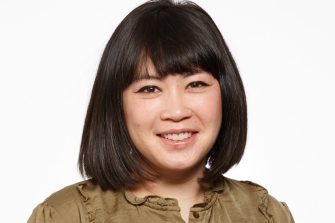
Dr Han Gaetjens
Han Gaetjens joined Australia’s Defence Science and Technology Group (DSTG) as a research scientist in 2007 and received her Ph.D in electrical and electronic engineering from the University of Adelaide in 2015. She has a background in target tracking and information fusion, specifically on track-before-detect methods for detecting and tracking dim objects. She has co-authored the book ‘Track-Before-Detect using Expectation-Maximisation, The Histogram Probabilistic Multi-hypothesis Track: Theory and Applications’ (Springer, 2018). Since 2020, Han has focussed on Space Domain Awareness (SDA) and liaises with Australia’s Defence stakeholders to lead DSTG’s research and development efforts to enhance Australia’s SDA technical capabilities. Han is a strong advocate for fostering positive, long term relationships in science and technology with our Defence colleagues, partners and allies.

Ellie Xiuqi Wang
Telecommunication Engineer Head, ITU
Telecommunication Engineer
Head, data treatment section of SPR (BR SSD)
International Telecommunication Union (ITU)
Ellie Xiuqi WANG is a Telecommunication Engineer and Head of the Data Treatment Section in the Space Services Department (SSD) at the International Telecommunication Union (ITU). Since 2011, she has been responsible for the registration and publication of frequency spectrum and orbit resources for space services within the Radiocommunication Bureau (BR).
With over 30 years of experience in satellite communications, Ellie began her career at a satellite earth station, advanced within a commercial satellite company, and later served as the Deputy Director of the Space Services Department for the Ministry of Industry and Information Technology (MIIT) in China, before joining the ITU.
Based in Geneva, Switzerland, Ellie has developed deep expertise in satellite systems and ITU regulatory procedures, in relation to both geostationary and non-geostationary satellite networks. She plays a key role in the Space Publication and Registration Division (SPR) of ITU BR SSD, working closely with national administrations and global industry experts to ensure compliance with the Radio Regulations.
As the BR coordinator, Ellie, under the guidance of SG4/WP4A chairs and BR management, successfully led the collaborative effort to publish the first edition of the ITU-R Small Satellite Handbook in July 2023. This accomplishment was widely recognized and appreciated by ITU members, further highlighting her dedication and leadership in the field of satellite communications.
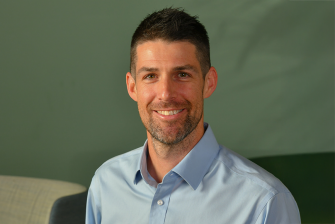
A/Prof Shannon Ryan
Shannon Ryan is an associate professor in Deakin University’s School of Engineering in Melbourne, Australia with 20 years’ experience in hypervelocity impact research.
A/Prof Ryan has a Bachelor of Aerospace Engineering and PhD from RMIT University in Melbourne, Australia. His PhD was awarded for research performed at Fraunhofer EMI (Freiburg, Germany) investigating the impact of space debris and micrometeoroids on ESA’s Earth Explorer series of satellites. He worked as a postdoctoral researcher in the Hypervelocity Impact Technology Group at NASA Johnson Space Center (Houston, USA), designing physical shielding systems for NASA’s manned spacecraft and developing tools for assessing mission risk posed by the impact of small debris particles. He is an author of NASA’s micrometeoroid and orbital debris protection handbook and the developer of NASA’s Ballistic Limit Analysis Program, a software tool that can be used for debris shield design and performance assessment.
A/Prof Ryan worked at the Defence Science and Technology Group (DSTG) for 10 years, focusing on impact mechanics and armour systems for land vehicles. He is a past president of the Hypervelocity Impact Society.
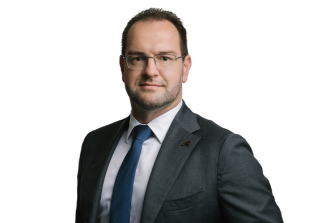
Christopher De Luis
General Manager Office of the Space Regulator, Australian Space Agency
Christopher De Luis is General Manager Office of the Space Regulator and a member of the Australian Space Agency Executive. He leads a team responsible for safety assurance and oversight of the rapidly growing Australian space sector. This includes space ports, orbital and sub-orbital launch and returns.
Prior to this, Chris was Head of Airworthiness Engineering at the Civil Aviation Safety Authority and previously worked as a civilian aerospace engineer in the Royal Australian Air Force and the Department of Defence. Chris is a chartered professional aerospace engineer with qualifications also in law and business.
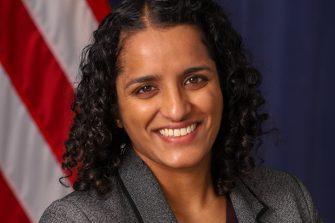
Christine Joseph
Policy Advisor at the Office of Space Commerce, NOAA
Christine Joseph serves as a Policy Advisor at the Office of Space Commerce with NOAA and the Department of Commerce, currently supporting the Traffic Coordination System for Space (TraCSS) program on technical, policy, and programmatic issues. Prior to her current role, Christine Joseph served with the U.S. House Committee on Science, Space, and Technology – Subcommittee on Space and Aeronautics. Her professional interests include space policy, aerospace human factors, and human-autonomy interaction. She previously worked in the aerospace industry as a human systems engineer with Aurora Flight Sciences. Christine has a Bachelor’s degree in Electrical Engineering from the University of Notre Dame and Master’s degrees in aeronautics & astronautics and technology policy from the Massachusetts Institute of Technology.
Panel Moderators
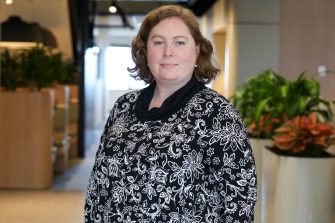
Elizabeth Pearce, Program Manager – Space
Elizabeth “Liz” Pearce has a background in all things space and has worked across multiple Australian Government agencies including the Bureau of Meteorology, Defence Science and Technology Group and the Australian Space Agency. Liz worked as a physicist for 14 years in areas of space weather, positioning, navigation and timing (PNT), robotics and autonomy, space domain awareness, launch and human spaceflight. Liz now manages the space program at KBR, with a focus on SDA products for Defence.
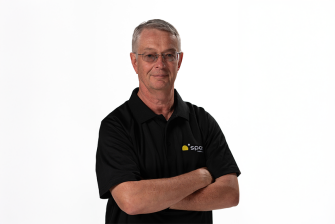
Ed Kruzins
Ed is Professor of Practice in Space Communications and Tracking at UNSW Canberra Space.
His current areas of research interest include deep space radar/optical detection and tracking of near-earth objects and asteroids as part of a deep space situation awareness of potentially hazardous natural objects. He also has interests in high data rate radio frequency, optical communications in space and related flight systems. Current research topics include analysis of radar and optical data from Apollo and Aten class asteroids to determine asteroid characteristics such as size, shape and rotation.
Ed held the position as Director of the NASA-JPL/CSIRO Canberra Deep Space Communications Complex (CDSCC) from 2012-2021 and was responsible for NASA's major southern hemisphere facility, tracking the fleet of 40 international deep space missions. He is a member of the Australian National Council of Space Engineering EA, Honorary Fellow of the CSIRO and Adjunct Professor University of Adelaide in space systems. He is also member of the International Space Exploration Coordination Group (ISECG) and International Mars Working Group (IMEWG) of international space agencies contributing to exploration of the Solar System.
Ed began his working career in Europe where he provided systems and design engineering for commercial and military satellite subsystems Olympus1, lnmarsat2, Telecom2 and Skynet 4. He obtained his PhD degree at Southampton University UK, in Aerospace Engineering and Science degrees with honours at the University of Sydney in Astrophysics. He is a Member of the Australian Institute of Company Directors (AICD), a graduate of UNSW Business School, Member of the Space Industries Association of Australia (SIAA) and remains a serving RAAF reserve officer.
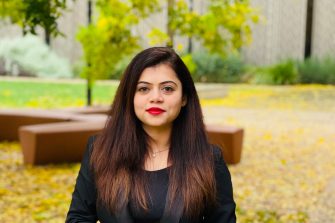
Rabbia Saleem
Dr Rabbia Saleem is a Research Associate at University of New South Wales (UNSW) Canberra Space, Australian Defence Force Academy.
The role leads towards interfacing Artificial Intelligence/ Machine Learning and space technology with an aim of a secure and sustainable structure for Australian and global space sector. The research is focused on intelligent space systems for space domain awareness (SDA) and cyber resilience, hence, making a strong impact on Australia's international SDA and space cyber credentials.
Previously, Dr Saleem has worked as a full time Doctoral Researcher at the school of Engineering, College of Engineering, Computing, & Cybernetics, the Australian National University (ANU). Her major research interests were machine learning for radio resource management, physical layer security, internet of things, intelligent reflecting surfaces, and 6G communication. She received her B.Sc. (Honours) and M.Sc. degree in Electrical Engineering from University of Engineering and Technology, Lahore, Pakistan in 2012 and 2016, respectively. Moreover, she is an Associate Fellow of Higher Education Academy and has over a decade experience of lecturing and supervising undergraduate and postgraduate students. She served as a Lecturer in the Department of Electrical Engineering, University of The Punjab as well as University of Engineering and Technology, Lahore, Pakistan. Also, she is an ambassador of STEM education for young women and is an active member of IEEE, IEEE Women in Engineering, IEEE Young Professionals, Women in STEM, Women in AI, and Women in Space. She was the Advisor Woman in Engineering, IEEE Punjab University Student Branch and has been awarded by a Gold Pin for organizing the international IEEE ComSoc Summer School program in 2016. As an early career academic, she was awarded with the Best Early Career Presentation award and Australian Space Research Conference in September 2022. She was also invited as a guest speaker at 3rd Annual ANU Women in STEM leadership conference in April 2023. Furthermore, she has been engaged with Young Women in Engineering (YoWIE) program at UNSW Canberra as a STEM role model for the next generation of women in STEM.
International Speakers
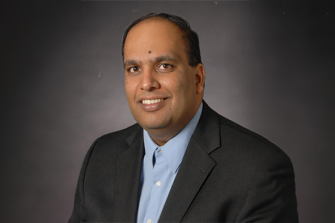
Puneet Singla - Pennsylvania State University
Dr. Puneet Singla is a Harry and Arlene Schell Professor of Engineering in the department of Aerospace Engineering at the Pennsylvania State University. He received his bachelor’s degree in Aerospace Engineering from the Indian Institute of Technology, Kanpur, India in 2000 and earned his doctoral degree in Aerospace Engineering from Texas A&M University, College Station in 2006. He was a faculty member of Mechanical & Aerospace Engineering at the University at Buffalo (UB) from 2006-2017. His research work involves fundamental development of new mathematical and computational approaches for uncertainty propagation through nonlinear dynamical systems, integrating sensing with numerical models, dynamic sensing, optimal control and developing models from sensor data. The interplay between dynamic system analysis, estimation and control lay the scientific groundwork for the development of a data driven framework for diverse problems of varying scales such as tracking resident space objects, trajectory planning for hypersonic vehicles, accurate prediction of toxic material plumes through the atmosphere or water, tumor motion modeling, and control of robotic systems. He is a recipient of the competitive NSF CAREER and the AFOSR Young Investigator awards for his research work. He is also the recipient of the young outstanding aerospace engineer award from Texas A&M University. He has authored over 200 papers to-date including 50 peer-reviewed journals articles. He is the principal author of a text- book entitled “Multi-Resolution Methods for Modeling and Control of Dynamical Systems,” (300 pages) published in August 2008 by CRC Press (Boca Raton, FL). He has received the best paper awards at the 2006 AIAA/AAS Astrodynamics Specialists Conference, 2009 International Information Fusion Conference and 2020 Dynamic Data Driven Application Systems Conference for his research work. His work in attitude estimation included algorithms supporting a successful experiment StarNav that flew on the STS-107. His work on uncertainty propagation was used to compute a probabilistic spatial-temporal estimate of ash presence during the April 2010 eruption of the Eyjafjallajökull volcano in Iceland. He is currently a deputy director of United States Space Force (USSF) funded multi-university SURI program titled Space Object Understanding and Reconnaissance of Complex Events (SOURCE). He is serving as an Associate Editor for AIAA Journal of Guidance, Control and Dynamics (since 2017) and IEEE Transactions on Aerospace and Electronic Systems (since 2015). He has also served as a guest editor for the special issue of the ASME Journal for Dynamic Systems, Measurement, and Control to commemorate the life, achievements, and impact of Rudolph E. Kalman. He has also conducted workshop on new advances in uncertainty quantification at AFRL-RV and national conferences to disseminate his research work to research practitioner.
He is a fellow of American Astronautical Society (AAS), an Associate Fellow of the American Institute of Aeronautics and Astronautics (AIAA) and Senior Member of the Institute of Electrical and Electronics Engineers (IEEE).
Travel kindly supported by
Poster Abstract
Abstract Submission for SSA/STM Conference 2024
Submit an Abstract for an Oral or a Poster Session. Closing date for submissions: 25 October 2024.
Information for Participants
The conference will include oral technical sessions and poster sessions, scheduled over three days (19, 20, and 21 November 2024). These sessions will provide an opportunity for conference participants to present their research in the fields space domain awareness and space traffic management. Abstracts may cover relevant basic research, technical developments, or improvements in practices. Submissions are encouraged (but not limited to) the following conference theme’s topics:
- Space Surveillance and Tracking
- Orbit Analysis and Prediction
- Decision Making, Manoeuvring, and Spacecraft Operations
- Ethics and Regulation
- Conjunction Analysis and Collision Avoidance
- Planetary Defence and Asteroid Detection
- Space weather/environment
- Cis-lunar Space Domain Awareness
- Cyber-threats and Resilience
The participants who would like to present are encouraged to submit a short abstract describing their research work. The abstract should be no more than 250 words in length.
Oral Presentations:
Oral presentations will be scheduled during the technical sessions. Each presenter will have 12 minutes during the session followed by 3 minutes for follow up questions.
Poster Presentations and Format:
Posters should be no larger than A1 size. Display boards will be provided. Posters will be attached to these using Velcro tabs. All the poster presenters are required to be present in-person next to their poster during the poster session. A camera operator and interviewer will travel around the session asking some quick questions from each of the poster presenters. The recording will be screened at the venue. Poster presenters will have the option of not being filmed in this way.
Venue
The sessions will take place in the building 32 at ADFA.
Kindly supported by
Bronze sponsor
Schedule
- Day 1
- Day 2
- Day 3
Time
Description
09h00 - 09h20
Conference welcome and Day 1 instructions
09h20 - 10h00
Keynote: GPCPT Crookes
10h00 - 10h40
Keynote: Barbara Golf
10h40 - 11h00
Morning Tea
11h00 - 12h00
Panel Session 1: Australia's role in Global Space Traffic Management
Bella Hatty
Duncan Blake
Terry van Haren
12h00 - 12h30
Keynote: Australian Space Agency
12h30 - 13h00
Keynote: Puneet Singla
13h00 - 14h00
Poster Lunch 1
14h00 - 14h30
Keynote: Han Gaetjens (DSTG)
14h30 - 15h30
Panel Session 2: Australia's SDA Challenges and Opportunities
Barbara Golf
Peter Crookes
Phil Ridley
Mark Rutten
15h30 - 15h50
Afternoon Tea
15h50 - 16h20
Keynote: Ellie Xiuqi Wang
16h20 -16h30
Day 1 wrap up
16h30 - 17h00
For those attending dinner, travel to dinner
18h30
Dinner
Time
Description
08h45 - 09h00
Day 2 instructions
09h00 - 10h30
Technical session 1: xGEO, Cis-lunar SDA and Deep Space SDA
0900 Lester Tuck AFRL
0930 Kelly Fast
1000 Panel session - Lester Tuck, Stephanie Smith, Ed Betar, Tim Bateman
10h30 - 11h00
Coffee/Tea break
1h00 - 12h30
Technical session 2: Sensors
12h30 - 13h30
Poster Lunch 2
13h30 - 15h00
Technical session 3: Sensors 2
15h00 - 15h30
Coffee/Tea break
15h30 - 16h00
Keynote: Shannon Ryan (Deakin)
16h00 - 17h00
Technical session 4: Mission systems
17h05 - 17h30
Participant group photo
17h30 - 19h30
Networking Drinks, Officers' Mess
Time
Description
08h45 - 09h00
Opening
09h00 - 09h30
Keynote: Christine Joseph (US Office of Space Commerce)
09h30 - 11h
Panel session: Cyber for SDA
11h00 - 11h30
Morning Tea
11h30 - 12h15
Panel Session: 2023 Conference Roundtable Summary
12h15h - 13h30
Poster Lunch 3
13h30 - 15h15
The Great Space Debate
15h15- 15h45
Close
Directions
The main conference venue is Building 32 on the campus of UNSW Canberra at the Australian Defence Force Academy
Address: Northcott Dr, Campbell ACT 2600.
Parking is available on Long Tan Road and Kapyong Road.
ADFA is serviced by ACTION Bus lines 54, 55, 56, and 59.
About UNSW Canberra Space
UNSW Canberra Space is a leader in the field of advanced intelligent satellite systems, developing and providing space and artificial intelligence research, technology and education to help meet national and global needs.
